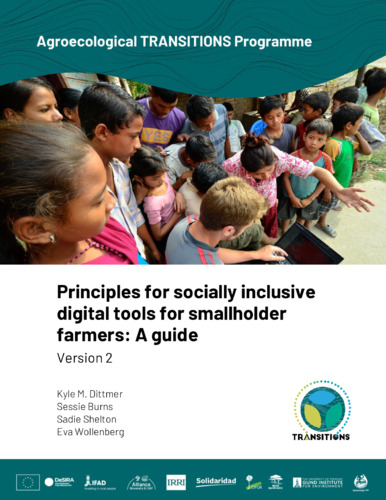Principles for socially inclusive digital tools for smallholder farmers: A guide. Version 2
Abstract
This guide addresses concerns with the current digitalization of food systems by providing principles for developing socially inclusive digital tools with smallholder farmers. These principles aim to increase social and livelihood benefits for diverse and underrepresented farmers. Co-creation of farm practices with farmers is emphasized as a key element of social inclusion, ensuring relevance to farmers’ livelihoods and robust technical solutions. The principles support digital developers and managers using digital tools with farmers and help funders, farmers’ organizations, or NGOs hold developers accountable to social inclusion principles.
Changes from Version 1:
Five new sub-principles were introduced, and six existing sub-principles were revised based on lessons from the Agroecological TRANSITIONS’ Inclusive Digital Tools (ATDT) project. Practical application of the principles highlighted areas for additional principles or refinements to support social inclusion better.
For livestock systems in Pará, Brazil, principles related to building on existing social networks (Principle 2.4), using participatory evaluation methods (Principle 3.5), and co-validating agroecological practices (Principle 3.6) were introduced. Principle 2.3 was refined to emphasize business models that are affordable and designed for long-term success. For rice systems in the Mekong River Delta of Vietnam, additional principles were introduced to ensure the digital tool's long-term success and accountability (Principles 4.5 and 6.4).
Trends in digital tool development and feedback from participatory group discussions also informed the updated principles. Principle 3.6 reflects the need for co-validation of AI-generated information. Principle 3.3 was revised to emphasize incorporating traditional and indigenous knowledge into digital tools.

